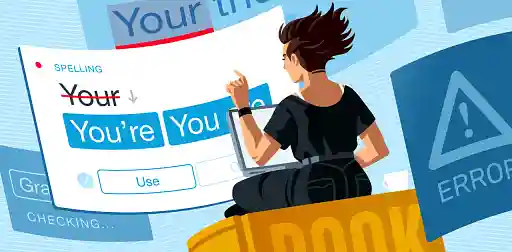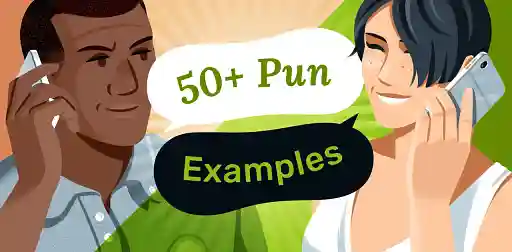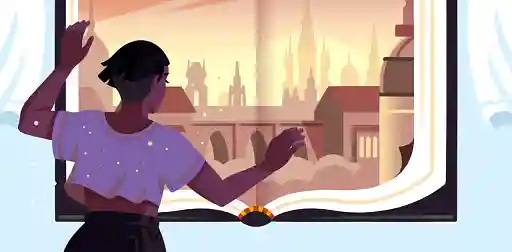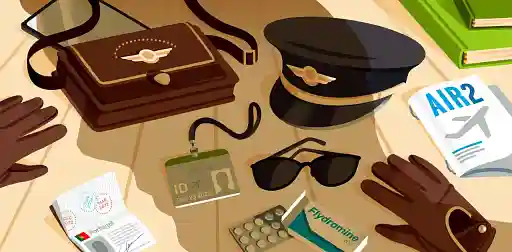Last updated on Oct 15, 2025
365+ Strong Verbs to Turn You Into a Literary Tyrannosaurus
Nick Bailey
Nick is a writer for Reedsy who covers all things related to writing and self-publishing. An avid fan of great storytelling, he specializes in story structure, genre tropes, and character work, and particularly enjoys sharing insights that spark creativity in fellow writers.
View profile →Writing is a storytelling medium. Every sentence is an opportunity to tell a part of that story, elaborating on the plot, characters, or atmosphere. This also opens up a world of options beyond just “Harry opened the door.” What if Harry “jimmied the door,” or “threw the door open”? By using strong verbs (or “action words”) that vividly convey meaning, we can eliminate the need for adverbs or overly descriptive language.
Here’s a quick table to illustrate how you can upgrade a “weak” verb to a strong verb:
| Category | Weak verb | Strong verb |
| Movement | walk | stride, dash, lumber, creep |
| Speech | say | whisper, bellow, murmur, proclaim |
| Action | do | grasp, hurl, demolish, craft |
Let’s dive deeper into it now!
Why should you use strong verbs?
A lot of the time, it simply comes down to using evocative verbs: doing words that not only tell us what is happening but how it is being done as well. “But wait!” you say, “isn’t that what adverbs are for?”
Q: What are the most common craft mistakes new authors make?
Suggested answer
One of the biggest mistakes I see from new authors is that they finish writing their manuscript and then they think they are done and ready for an editor to go through and review.
Writers need to be their own editors first. Because there are so many potential new authors every day, it's imperative that writers go back and edit their work thoroughly. That means reading, and rereading what they've written to understand how their characters develop through their novel, or how the topics that they brought up in chapter two are refined and built upon in chapter nine. Through that reading process, writers should be editing their work as they find pieces that aren't strong enough or need to be altered to make a better overall manuscript.
Matt is available to hire on Reedsy ⏺
The most common writing mistake I see from first-time authors is cramming too much into the first chapter. Your first chapter is a meet and greet, where you establish credibility, likability, and optimism that the book is worth the reader's time. Hook the reader, show your personality, but don't dump all your knowledge on them at the beginning of the book. Take them on an interesting, helpful journey,
Mike is available to hire on Reedsy ⏺
Adverbs: who needs them?
In his memoir On Writing, Stephen King had this to say on adverbs:
“The adverb is not your friend. With adverbs, the writer usually tells us he or she is afraid he/she isn’t expressing himself/herself clearly, that he or she is not getting the point or the picture across.”
Adverbs, by definition, are modifiers that writers can use to describe an action. But more often than not, you can use a strong verb that makes the adverb redundant:
- He walked slowly → He sauntered
- She ate voraciously → She gobbled
- They sleep lightly → They dozed
Apart from simply being economical your word count and avoiding purple prose, there are plenty of sound reasons to choose stronger verbs.
Show, Don’t Tell
The granddaddy of writing aphorisms: show, don’t tell. The principle behind this is as follows: it’s far more satisfying for readers to infer what’s happening than for every piece of information to be spoon-fed to them. But perhaps more importantly, “showing” keeps a reader under the spell of the story, while “telling” reminds them that there’s a narrator at work, spinning a tale.
By choosing a solid, evocative verb, you deliver so much more information to the reader while remaining under the radar.

FREE COURSE
Show, Don't Tell
Master the golden rule of writing in 10 five-minute lessons.
Maintain immediacy and build pace
Another reason for maintaining an arsenal of strong verbs is to preserve and build momentum. By economizing on words and packing each action with more meaning, you can up the pace of a passage. Strip out ALL the adverbs and adjectives and deploy some well-chosen verbs, and watch how your writing hums along like a cigarette boat off the coast of Miami.
That brings us to the main event: our list of 300+ strong verbs. Of course, this is by no means an exhaustive list! But by browsing through these hand-picked examples of strong verbs, you should start to get an idea of how many words are already in your vocabulary — and how you can employ them in your writing.
Moving verbs

The quick brown fox jumped over the lazy dog.
How can a phrase with so many letters of the alphabet also be so dull? It’s a wonder the fox didn’t conk out mid-sentence and collapse onto the lethargic dog!
You can switch out boring words like ‘walk’ and ‘run,’ and spice up your characters’ motions with these verbs.
- Advance
- Bolt
- Bound
- Burst
- Bust
- Bustle
- Charge
- Clamber
- Climb
- Crash
- Dash
- Depart
- Deviate
- Escort
- Explore
- Extend
- Fly
- Gravitate
- Hobble
- Hurry
- Journey
- Launch
- Lead
- Leap
- Lurch
- Mount
- Plunge
- Race
- Retreat
- Revolve
- Rush
- Saunter
- Scamper
- Skip
- Slide
- Slink
- Slip
- Sneak
- Soar
- Spurt
- Storm
- Stroll
- Stumble
- Surge
- Tail
- Toddle
- Travel
- Trip
- Trudge
- Usher
- Weave
- Wind
Handling verbs

You don’t always have to have your protagonist ‘holding’ something or ‘putting’ it down — that tells us nothing about the character, object, or the action.
Q: How can writers use stereotypes and tropes to their benefit when creating a character?
Suggested answer
Well, stereotypes and tropes exist because they are the comfort food of readers, and should be the comfort food of writers too. Not to the extent that you write cliche stories by overusing the same old thing. But by the fact that their presence in certain story types is expected and even desired by fans of that story type, so to try and write without them can leave readers unsatisfied and the story feeling incomplete.
There are great books out there on this, John Truby in particular has a great one out. Knowing the stereotypes of a heroes journey, for example, gives you lots of options for side characters and supporting characters to help a hero on certain types of quests. The tropes are the expected encounters and obstacles that hero will encounter along the way.
If you start by mapping these out and identifying which are required (tropes most of all) and which work best for your story but are optional (stereotype characters) then you can take them and twist them in unique and interesting ways, even flip them around in timeline or approach in ways that make it clear they are there (and meet reader expectations and preferences) while still avoiding cliche expectation and creating interesting and unique characters, world, and stories that captivate readers.
Bryan thomas is available to hire on Reedsy ⏺
Trope = yes
Stereotype = no
A stereotype is an oversimplified view of a type of person, based on one aspect of their identity, like race or gender or hair color or where they're from. It's important to know stereotypes so you can avoid them in your writing, both so you won't be generic and so
Tropes, on the other hand, are like adding sugar to cake, rather than salt: You want to know what your audience came for, so you can give it to them!
Tropes are things with universal appeal that audiences come back for time and time again. (Not to be confused with a cliche, which is just something that has been overused until it's cringey. For instance, the villain in a YA novel being a mean blonde cheerleader is both a cliche and a stereotype. But a trope might be that the main character is an underdog who manages to win the heart of the most high-status boy in school!) Examples: enemies to lovers, amateur detective, chosen one, only one bed...
Intelligent use of proven tropes, combined in a new and unique way, are the fastest way to genre writing success!
Michelle is available to hire on Reedsy ⏺
A trope is something that is instantly familiar to readers: a character type, setting, plot point, or style of writing that is recognizable and tied to a specific genre.
For example, one familiar romance story structure is the “enemies to lovers” plot. This pattern is immediately recognizable to readers, and although it is used often, writers are still finding new and unique ways to spin it, and readers still love engaging with it.
Another popular trope is that of “The Chosen One.” Think about it: Both Luke Skywalker and King Arthur find a magical sword, receive the guidance of an older, wiser mentor, and go on a journey to storm a stronghold to save a princess. Even though the building blocks are the same, the stories are vastly and entirely different…and centuries apart!
There are hundreds of ways to apply this trope and come out with a unique and fresh story.
Tropes are the conventions, ideas, or motifs that make up these basic building blocks of all storytelling. In order to tell a fantastic story, tropes are necessary (and not to be confused with clichés, which are devices, expressions, or phrases that have been used so often and in so many places that readers have become tired of them, and desensitized to them). But why are they necessary?
Well, tropes are baked into every genre that we know and love. If you’re writing a western novel, odds are you might have a lone cowboy or a bumbling sheriff in there. If you’re writing a thriller or mystery novel, you might find yourself creating a gritty, lone-wolf detective, who acts first and asks questions later. Just because these tropes have been used before, doesn’t mean they’re tired!
If you’re writing in a specific genre, in order to use tropes effectively, you should be intimately familiar with the tropes of that genre. Knowing them inside and out means you’ll have your best shot at subverting them and spinning them in new ways that readers will enjoy (and avoid veering into cliché territory).
Think of books in the genre that you’ve read before. Was there one that you didn’t like? Ask yourself: What specifically made you dislike it? It might be that a trope wasn't used effectively, and if you can identify exactly what disappointed you about the way that trope was used, it can help you discover what you wished that writer might have done differently. And then: poof! Suddenly you have a thread of inspiration you can pull on to get some ideas for your own story.
Remember: tropes are patterns. And patterns can be twisted, bent, and manipulated. Just be careful not to break the pattern, or you risk readers finding it difficult to relate to a trope they cannot recognize and therefore relate to.
Writers just like you are still finding fresh ways to put a spin on tropes of all kinds, and using those building blocks to build entirely new and unexpected things for us to read!
Lesley-anne is available to hire on Reedsy ⏺
When it comes to building characters, tropes and stereotypes get trashed. Authors shy away from them, not wanting their stories to sound stale because they're leaning on well-worn tropes. But applied sparingly, these storytelling crutches can enrich your characters, allow readers to jump in easily, and even lay the foundation for surprise and depth.
Tropes are a short-cut for your readers. They give readers a feeling of who a character is and where they stand in the story. A "mentor," for instance, gives a feeling of guidance, a "reluctant hero" gives a feeling of inner conflict, and a "grizzled detective" gives a sense of experience and exhaustion. These archetypes shave space out of your storytelling so readers can catch on to relationships and dynamics immediately. The art is to combine them with unique characteristics that make your character stand out.
Stereotypes are worse. They can establish context rapidly, but they can also be lazy or toxic if they are not challenged. The trick is to use them as a springboard, and not an endpoint. A character who holds the "shy bookworm" description might secretly be a social master manipulator. That interplay between expectation and reality keeps things interesting and provides depth.
Another great way to use tropes is to subvert expectations. Use a "princess in distress" who saves herself or a "charming rogue" who has imposter syndrome. By turning the expected tropes on their head, you catch the reader off guard without losing respect for those conventions.
Ultimately, the most compelling characters are born from layers beyond the trope. Surface traits like charm, wit, or wisdom draw people in, but motivation, flaw, and contradiction create a character. Tropes will also support your themes—whatever they may be, from redemption to generational insight to ambition's cost—adding cohesiveness to your narrative but still permitting complexity.
The issue happens when writers rely on tropes or stereotypes without questioning them. Does every single one serve the story, add depth, and make your character more human? Used consciously, tropes and stereotypes are not clichés—they are tools used to make your characters immediately recognizable, resonant at a thematic level, and unforgettable.
John is available to hire on Reedsy ⏺
While it's worth noting the use of tropes and stereotypes can be comforting -- I love an enemies-to-lovers, "Who did this to you?" trope in romance, and the Chosen One in young adult makes me nostalgic for the golden age of dystopian; however, you can also use stereotypes and tropes by subverting them.
A great example is Victoria Aveyard's RED QUEEN. I won't reveal the twist, but it took a certain romantic stereotype, crushed it to pieces, and surprised readers in a way that still gives me (delightful) trauma! Another more general example is the Game of Thrones series and the way that George RR Martin kills characters off left and right. Those you thought were heroes or "chosen" are not guaranteed to be around long enough to fulfill any destiny.
So by all means, embrace tropes and stereotypes to give readers what they want; however, think about surprising them a little bit. See how you can tell a different story.
Grace is available to hire on Reedsy ⏺
There is a common misconception within writing circles that "trope" = bad or cliche. While yes, certain tropes and character traits can become overused and cliche, tropes are more like reader expectations when they pick up a book from a certain genre. For instance:
- In romance, tropes are things like friends to lovers, enemies-to-lovers, he falls first, grumpy neighbor
- In YA fantasy, tropes can be things like the Chosen One, Love Triangles, or Hidden Magic
- In middle grade, tropes can be the power of friendship, magical animals, magical academies
While not all books in these genres include all of these things, and while these things can certainly be cliche if you don't put your unique take on it, they are what readers enjoy about a genre. After all, isn't that why you read a certain genre, because there are tropes and elements within that you enjoy?
The way to use these stereotypes and tropes to your benefit is to use them as a framework, understanding how they operate and why readers enjoy them. Then, sprinkle your unique author magic on them. How you describe characters, the dynamic between two characters, how certain elements show up or are utilized, all these can be unique to you and your book. You're not looking to reinvent the wheel, but rather give it a new coat of paint, your coat of paint, so that you write the story you want while delivering a satisfying reader experience.
Sean is available to hire on Reedsy ⏺
Here are some sweet alternate verbs that will pull readers into your scene about a guy with a thing in his hand:
- Capture
- Catch
- Clasp
- Clutch
- Coddle
- Dangle
- Deposit
- Drag
- Drop
- Ensnare
- Envelop
- Expose
- Extract
- Fling
- Fondle
- Grasp
- Grip
- Grope
- Intertwine
- Juggle
- Peck
- Pilot
- Place
- Pluck
- Prune
- Remove
- Scrape
- Scratch
- Scrawl
- Seize
- Serve
- Snag
- Sprinkle
- Steal
- Steer
- Strain
- Stretch
- Swipe
- Trim
- Twirl
- Uncover
- Unpick
- Untangle
- Wield
- Wrench
- Wrest
- Wring
- Yank
Speaking verbs

Buckle up: you’re about to get some advice that sounds contradictory, but really isn’t. The golden rule about writing dialogue is that you shouldn’t use dialogue tags more exotic than “he said,” and “she said.” And that is true. Doctor Watson “ejaculating” in surprise is much more distracting than Watson saying: “My word, Holmes. What a shock!”
Q: What are some techniques authors can use to introduce characters naturally through dialogue?
Suggested answer
When you're going to create a character through dialogue, what you want to do is provide the reader with information about this individual without interrupting the action for exposition.
One good way to do that is to think about how actual people reveal themselves in conversation: through what they say, the cadence of their speech, and what they focus on. Instead of telling us about what a character is sure, nervous, or resentful of, you can make those qualities evident in what they say.
A certain sort of character might answer quickly or deflect, while an unsure one might lie or offer more questions than answers. You can also include context of hinting—perhaps another character does something in response to an unexpected comment, or someone uses a nickname that suggests history. This allows the dialogue not just to define who the character is, but also how they exist in relationships with the world around them. It's generally more engaging to give little hints than to tell everything.
By piling personality, background, and relationships onto conversations, you create a sense of authenticity so that readers feel they're reading about a real person rather than getting a synopsis.
John is available to hire on Reedsy ⏺
Dialogue is one of the most powerful ways to introduce your characters and bring them to life for readers. When done well, it reveals personality, relationships, and motivations—all in a way that feels natural and engaging. Here are a few techniques to make character introductions through dialogue memorable, with examples from authors I’ve worked with.
Show personality through speech patterns
The way a character speaks—their tone, choice of words, and rhythm—can reveal a lot about who they are. In Losing Juliet by June Taylor, the dialogue between two adult female characters is a perfect example. One character is guarded and precise, while the other’s tone is more casual and assertive. This contrast instantly tells us about their personalities and sets up their complex dynamic. When editing, I often help authors create unique speech patterns that make each character’s voice distinctive.
Reflect relationships through dialogue
How characters speak to each other reveals their relationship dynamics. In Losing Juliet, Taylor uses subtle hints in the dialogue to convey past secrets and tension without spelling it all out. Readers sense the history and conflict between the characters, making the dialogue feel rich and layered. When I work with authors, I encourage exploring these nuances in relationships, showing rather than telling.
Reveal motivation through subtext
Great dialogue often goes beyond what’s explicitly said. In The Hanged Man Rises by Sarah Naughton, the children’s dialogue is filled with innocence and curiosity, yet it often hints at deeper fears and uncertainties. This subtle layer adds intrigue without needing direct exposition. I frequently work with authors to find opportunities for subtext, letting readers read between the lines to discover characters’ hidden motivations.
Show conflict and tension
Conflict in dialogue can reveal a character’s core traits. In The Hanged Man Rises, Naughton’s children’s dialogue shows both their vulnerability and resilience, heightening the story’s suspense. In Losing Juliet, conversations between the protagonists highlight simmering anger and unresolved issues, offering readers a glimpse of what drives each character. When editing, I encourage authors to think about how characters might speak differently under pressure—revealing who they are when emotions run high.
Balance dialogue with actions and reactions
Dialogue is most impactful when paired with physical cues. In Losing Juliet, Taylor often uses gestures and subtle actions to deepen the impact of what’s said (or left unsaid). These small cues add depth, creating a more immersive experience. I often advise authors to integrate these details, as they can make dialogue feel more real and relatable.
Reflect character growth in speech
As characters evolve, so should their dialogue. In The Hanged Man Rises, Naughton’s young characters’ dialogue changes as they face challenges, reflecting their growth over the course of the story. This shift makes their journey feel authentic, and I often encourage authors to consider these changes as they develop characters’ arcs.
Shelley is available to hire on Reedsy ⏺
How much or how little a character "speaks" says a lot about them. A dialect can also reveal where they are from. Broken English or a stutter can also say a lot. Dialogue is a great way to "show" and not "tell."
Melody is available to hire on Reedsy ⏺
The main thing to get across when introducing characters through dialogue is to write it so it feels natural. Constantly ask yourself if the way you're making them speak is the way regular people in those circumstances would speak. If it sounds too stilted or infodump-y, that's going to distance your reader from the character because they'll feel unreal, manufactured—just there to move the plot along.
Brett is available to hire on Reedsy ⏺
Yet in the rare cases where “said” doesn’t do the trick, here are some strong alternate verbs for characters who are flapping their lips:
- Advise
- Amplify
- Assert
- Bellow
- Blab
- Brief
- Broadcast
- Command
- Converse
- Croon
- Crow
- Gab
- Garble
- Gloat
- Groan
- Growl
- Gush
- Impart
- Instruct
- Mimic
- Moan
- Muse
- Notify
- Recite
- Report
- Roar
- Shriek
- Snarl
- Snipe
- Tattle
- Wail
However, if you are looking to beef up your arsenal of dialogue tags even more, why not download our free list of 150 other words for ‘said’?

FREE COURSE
How to Write Believable Dialogue
Master the art of dialogue in 10 five-minute lessons.
Thinking verbs

Dust off those thinking caps — it’s time to get our noggins whirring with some light mental gymnastics. Just as there’s more than one way to run your mouth, you have plenty of different options to describe what’s going on upstairs.
As with “said”, you don’t always need to get flashy with an outside-the-box verb. Most of the time, “thought” does the job just fine. Still, here are a few brainy alternatives for when you want to get a little more specific:
- Analyze
- Assess
- Brood
- Conceptualize
- Conclude
- Consider
- Contemplate
- Deduce
- Decide
- Deliberate
- Dwell
- Estimate
- Envision
- Evaluate
- Examine
- Fantasize
- Formulate
- Hypothesize
- Judge
- Infer
- Meditate
- Obsess
- Ponder
- Rationalize
- Reason
- Recollect
- Reflect
- Relive
- Speculate
- Suspect
- Theorize
- Weigh
- Wonder
Creating verbs

In the beginning, there was... well, a whole lot more than just "create". Whether your character is building a birdhouse or crafting the next great American novel, bland verbs like "create" tell us zilch about the process, effort, or artistry involved.
Q: Should I follow current trends or write the story I’m most passionate about?
Suggested answer
If you write a book inspired by 2025 trends you might find that by the time it's ready for submission and even publication the trend has moved on to something new. It takes a long time to write a book: you have a better chance of sustaining momentum and enthusiasm if you stick to your passion project. I rather believe that readers pick up on that passion too.
Susanna is available to hire on Reedsy ⏺
The issue with following current trends is that the trend may be over before you get your book completed and out to the world. If you write what you are passionate about, the story will usually end up being stronger because you are writing a story that means a lot to you, as opposed to writing something just because you think it might sell.
However, you want to be sure the story you are passionate about still has a strong possibility of selling by avoiding cliches and plots that have been overworked and overdone.
Strong stories that readers can relate to will have a good chance of finding an audience no matter the genre.
Melody is available to hire on Reedsy ⏺
“Made” might get the job done, but it's about as exciting as watching paint dry on a rainy Tuesday. When you want to show readers the sweat, skill, and soul that goes into bringing something new into the world, you need verbs with some serious creative muscle:
- Assemble
- Author
- Build
- Carve
- Chisel
- Compose
- Conceive
- Construct
- Craft
- Curate
- Design
- Develop
- Engineer
- Etch
- Erect
- Fashion
- Forge
- Form
- Invent
- Manufacture
- Mold
- Plot
- Sculpt
- Shape
- Sketch
- Stitch
Attacking verbs

Arnold hit the other robot powerfully, who then used his .44 Magnum to shoot him back.
Boo. Hiss. Snooze. In action scenes, your job as a writer is to excite the reader — and for that, you need to quicken the pace of your writing! There’s no time for adjectives or adverbs that lengthen sentences. Pick verbs that evoke the movements, speed, and emotions that you’re looking for. Start here:
- Attack
- Bash
- Batter
- Besiege
- Blast
- Bombard
- Chip
- Chop
- Cleave
- Collide
- Crush
- Demolish
- Dismantle
- Eradicate
- Fight
- Grapple
- Hack
- Lash
- Quash
- Raid
- Ravage
- Rip
- Scorch
- Shatter
- Shock
- Slash
- Smash
- Smite
- Strike
- Struggle
- Tussle
- Wallop
- Wreck
- Wrestle
- Zap
- Zing
Sensing verbs
In films, a lot of storytelling is done through the closeup: a wide shot of a rotting corpse will cut to a close-up of a grizzled detective. He’ll probably have his eyes squinted as he scrutinizes (see what we did there?) the body and wonders what happened. However, that’s cinema — and books are not quite as visual a medium.
Q: What techniques can authors use to hook readers from the first page?
Suggested answer
Start with your main character doing something somewhere and start in the middle of the action. If there is a hurricane coming, have them board up the windows of their home. If they are dreading an upcoming test at school, have them look over their last test grades and worry that this next test won't be any different.
You want to avoid "talking heads." This is what publishers think when there is dialogue going on between characters, and because there is no sense of "place" or "setting", the story comes off as characters "talking in space." This is why you want the characters to be somewhere and do something in every new scene you draft, not just the opening.
Readers like to visualize the action in a book, even if the "action" is inward. So start off with a visual picture of your main character doing something, and this should hook readers.
Melody is available to hire on Reedsy ⏺
I recall reading a memoir of a famous tennis player and he started it by plunging the reader into his experience of facing a relentless machine shooting balls across the net to him -- all the fatigue and pressure of trying to become a pro was encapsulated in the scene. Much more interesting than starting it with when and where he was born etc.
John is available to hire on Reedsy ⏺
Luckily, a well-deployed verb in context can imply how a character is reacting to something they’re witnessing. So take a peek at these:
- Behold
- Detect
- Discern
- Discover
- Eavesdrop
- Eyeball
- Gawk
- Gaze
- Glare
- Glimpse
- Glower
- Heed
- Inspect
- Locate
- Notice
- Observe
- Peek
- Peer
- Perceive
- Picture
- Pinpoint
- Probe
- Realize
- Regard
- Scan
- Scowl
- Scrutinize
- Sense
- Sniff
- Stare
- Spot
- Scope
- Spy
- Squint
- Survey
- Watch
Standing verbs

Sure, someone might be standing on the street — but what else are they doing? You don’t have to tell us that they’re playing on the phone or thinking about their vacation, but you can give us a better picture of how they’re standing with one of these actions:
- Brace
- Hover
- Huddle
- Lean
- Lurk
- Lounge
- Loiter
- Lodge
- Park
- Perch
- Plant
- Plop
- Position
- Pose
- Rest
- Rise
- Sink
- Sag
- Skulk
- Slouch
- Sprawl
- Settle
- Slump
- Straighten
- Swoon
Eating verbs
The Duchess of Devonshire doesn’t dine in the same way that a soldier in the trenches scoops from his mess tin. Pick the right verbs and you'll have your readers (and characters) eating out of your hand.
Q: What's the best piece of writing advice for an author who wants to improve their craft?
Suggested answer
Join critique groups! These were invaluable to me when it I started writing and even taught me how to edit! Reading books will become dated with old advice, so stay up to date with blogs, trends, audiences, and read, read, read!
Stephanie is available to hire on Reedsy ⏺
Practice and read!
In the same way that you need to practice a musical instrument to get better, you need to do the same with writing too. Very few writers will publish the first book they ever write!
The other thing that will help you to improve your writing craft is reading. Read the books that are selling well in your genre right now, not just the bestsellers from a decade ago. Study them. Look at the reviews for these books and listen to what readers are saying.
There are loads of brilliant books that will help you to write an effective novel as well (Into the Woods by John Yorke, The Science of Storytelling by Will Storr, Story Genius by Lisa Cron and Save the Cat Writes a Novel by Jessica Brody are a few of my favourites). Even if you don't agree with everything they say (I don't necessarily agree with every piece of advice in the above!) it's so helpful to see a range of different perspectives. You'll also quickly be able to see the patterns and advice from these books in the bestsellers you read. There are also loads of podcasts, blog posts, YouTube videos and audiobooks out there too, as well as Reedsy's own masterclasses!
Siân is available to hire on Reedsy ⏺
- Bite
- Chew
- Chomp
- Devour
- Feast
- Gnaw
- Gobble
- Gorge
- Inhale
- Munch
- Nibble
- Pick
- Sample
- Savor
- Scarf
- Scran
- Slurp
- Sip
- Smack
- Snack
- Swallow
- Taste
- Wolf
Transforming verbs
How do you paint a word-picture of a cute alien who is transmogrifying into a deadly monster? And how can you explain to people what it’s like being on the deck of an aircraft carrier, with its various moving parts?
If you’re shouting, “Verbs! Verbs!” then you’ve been paying attention.
- Absorb
- Alter
- Atomize
- Balloon
- Enlarge
- Erase
- Expand
- Explode
- Heighten
- Intensify
- Magnify
- Melt
- Modify
- Multiply
- Mushroom
- Mutate
- Puff
- Refine
- Revitalize
- Revolutionize
- Rust
- Shrivel
- Snowball
- Supersize
- Swell
- Throb
- Transfigure
- Transform
Shining verbs
“Don’t tell me the moon is shining,” Chekhov once wrote. “Show me the glint of the light on broken glass.” As a tip of the great Russian dramatist and short story maestro, we’ll finish up with some more alternatives for shining.
- Beam
- Dazzle
- Flash
- Flicker
- Gleam
- Glimmer
- Glisten
- Glitter
- Glow
- Radiate
- Shimmer
- Sizzle
- Sparkle
- Twinkle
Well-chosen, powerful verbs are the secret weapons in a wordsmith’s holster. Always remember that using a bog-standard, overused verb is a missed opportunity. Make every word count, and give your readers something they can get lost in.
Have we missed out on your favorite strong verb? Let us know in the comments below!








2 responses
Camilla Rose says:
19/09/2019 – 00:54
I think you should add like "Looking verbs" so to speak. Like watched, stared, glanced, etc.
↪️ Martin Cavannagh replied:
07/10/2019 – 15:53
Oh, great suggestion! We'll do just that with next update :)